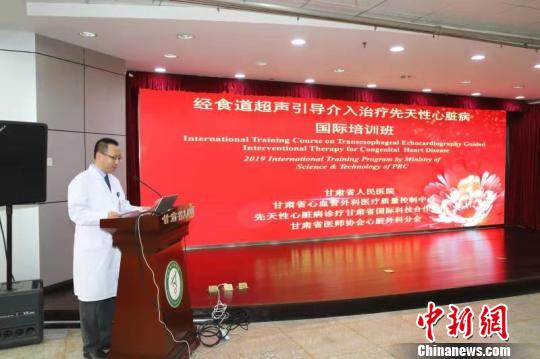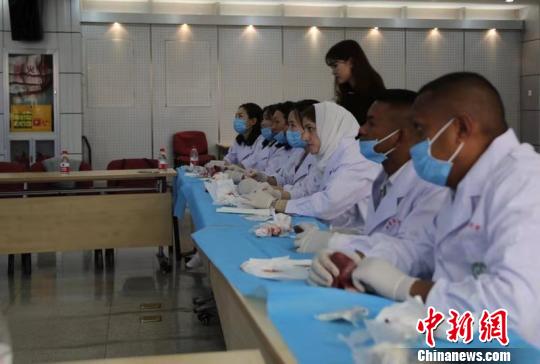

Twenty people from seven countries including Mongolia, Madagascar and Pakistan will attend the 15-day training program in Gansu to provide the best treatment plan for more congenital heart disease patients in the world and promote the advanced medical technology as seen in Gansu for the benefit of countries along the Belt and Road route.
The training program is sponsored by the Department of International Cooperation of the Ministry of Science and Technology of China and will open in Gansu Provincial People's Hospital on Oct. 10.

The open ceremony of the training program in Gansu. (Chinanews.com/Fan Xiaolei)
Congenital heart disease is the most common congenital malformation in birth defects, accounting for about one-third of all congenital abnormalities. Prevention and treatment of congenital heart disease has become a major public health concern that seriously affects the quality of the birth population and the health of children.
The technology targeting congenital heart disease pioneered by China can be realized in ordinary operating rooms without the support of large imaging equipment, which significantly reduces the medical cost and is in line with the national conditions of developing countries along the Belt and Road route.

Twenty people from seven countries including Mongolia, Madagascar and Pakistan attend the training program in Gansu. (Chinanews.com/Fan Xiaolei)
Li Xingyong, Secretary of the party committee of Gansu Provincial People's Hospital, pointed out that the technology China offers boasts advances, safety and economical treatment all together. The popularization and application of this technology has practical significance for optimizing the treatment program of congenital heart disease, reducing the economic burden of patients, and enhancing medical exchanges and mutual trust among developing countries along the Belt and Road route.
Medical science has no national boundaries. He hoped that trainees could bring the technology back to their own countries and benefit their own people.

 Award-winning photos show poverty reduction achievements in NE China's Jilin province
Award-winning photos show poverty reduction achievements in NE China's Jilin province People dance to greet advent of New Year in Ameiqituo Town, Guizhou
People dance to greet advent of New Year in Ameiqituo Town, Guizhou Fire brigade in Shanghai holds group wedding
Fire brigade in Shanghai holds group wedding Tourists enjoy ice sculptures in Datan Town, north China
Tourists enjoy ice sculptures in Datan Town, north China Sunset scenery of Dayan Pagoda in Xi'an
Sunset scenery of Dayan Pagoda in Xi'an Tourists have fun at scenic spot in Nanlong Town, NW China
Tourists have fun at scenic spot in Nanlong Town, NW China Harbin attracts tourists by making best use of ice in winter
Harbin attracts tourists by making best use of ice in winter In pics: FIS Alpine Ski Women's World Cup Slalom
In pics: FIS Alpine Ski Women's World Cup Slalom Black-necked cranes rest at reservoir in Lhunzhub County, Lhasa
Black-necked cranes rest at reservoir in Lhunzhub County, Lhasa China's FAST telescope will be available to foreign scientists in April
China's FAST telescope will be available to foreign scientists in April